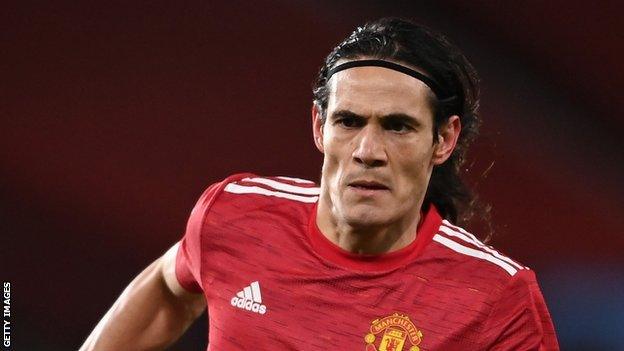Edinson Cavani not intentionally racist in social media post, but term was offensive, says FA
- Published

Edinson Cavani joined Manchester United on a free transfer in October
Edinson Cavani was not intentionally racist in the Instagram post that brought him a three-match suspension, the Football Association says.
But a Premier League football fan would have deemed a word in the post "racially offensive", the FA added in its written reasons for the ban.
Manchester United striker Cavani, 33, was fined £100,000 and banned for a post containing a Spanish word that is offensive in some contexts.
The term was intended for a friend.
Cavani, who made the post on 29 November, deleted it immediately and apologised when it was explained to him how the term caused offence. He pleaded guilty to a Football Association charge of using insulting and/or improper words, and was banned on 31 December.
Explaning its reasons for the decision, the FA independent regulatory commission said it was "surprised" that, at the time of the post, he had received no media training from Manchester United, given the size of his Instagram following.
"In light of the player's high profile in the game, his inability to speak English and the fact that he had approaching eight million Instagram followers, the commission were surprised that no such 'training' had been specifically put in place for the player by his club," the FA commission said.
However, in imposing the minimum punishment for using insulting and/or improper language, the commission noted in mitigation that Cavani and United "have taken steps to ensure that the player has a greater understanding of his responsibilities on social media".
The commission wrote: "The unique circumstances and facts of this player's case were of such significance that a departure from the standard minimum was justified in order to avoid an unjust outcome."
It was satisfied that the post had been sent in "affectionate appreciation" of a friend offering him their congratulations.
Along with the ban and fine, Cavani must also complete a "face-to-face" education programme.
When the ban was issued, Manchester United said: "As he has stated, Edinson Cavani wasn't aware that his words could have been misconstrued and he sincerely apologised for the post and to anyone who was offended.
"Despite his honest belief that he was simply sending an affectionate thank you in response to a congratulatory message from a close friend, he chose not to contest the charge out of respect for, and solidarity with, the FA and the fight against racism in football.
"While it is clear that context and intent are key factors, we note that the independent regulatory commission was required to impose a minimum three-game suspension.
"The club trusts that the independent regulatory commission will make it clear in its written reasons that Edinson Cavani is not a racist, nor was there any intent in relation to his post."
'All clubs will be far more aware of this'
Simon Stone, BBC football reporter
There are sympathies with Cavani here. Manchester United have backed their player and the judgement underlines the Uruguayan is not a racist and meant no racist intent.
In addition, the Uruguayan players' association and the South American confederation (Conmebol) have come out in defence of Cavani and attacked the FA.
However, it is also clear that to post certain comments in the UK runs the very real risk of offence, no matter what the interpretation is in Uruguay.
The FA could hardly ignore the situation - and a change in their own regulations last summer means a three-match ban was the lightest punishment that could have been imposed.
The interesting thing is the comment about social media training, specifically the absence of it.
Cavani had to quarantine for a fortnight after his arrival in England, which disrupted his own assimilation into life at United and meant he was not around for the normal media training course he would have gone on to.
Would the media training have covered the type of danger that led to Cavani's ban? Quite possibly not.
One thing is for sure, all clubs will be far more aware of this in future which, while no consolation for Cavani, is not a bad thing.

Best of BBC Sounds 2020: When Peter Crouch got a very Royal guest...
Best of BBC Sounds 2020: Ian Wright picks the tunes that have soundtracked his life
